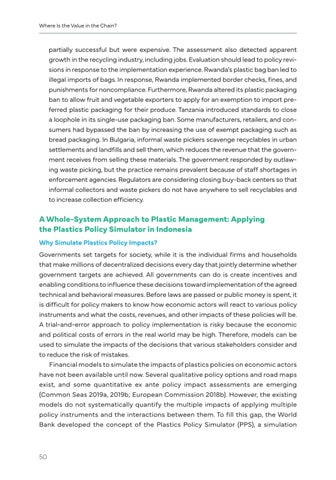Where Is the Value in the Chain?
partially successful but were expensive. The assessment also detected apparent growth in the recycling industry, including jobs. Evaluation should lead to policy revisions in response to the implementation experience. Rwanda’s plastic bag ban led to illegal imports of bags. In response, Rwanda implemented border checks, fines, and punishments for noncompliance. Furthermore, Rwanda altered its plastic packaging ban to allow fruit and vegetable exporters to apply for an exemption to import preferred plastic packaging for their produce. Tanzania introduced standards to close a loophole in its single-use packaging ban. Some manufacturers, retailers, and consumers had bypassed the ban by increasing the use of exempt packaging such as bread packaging. In Bulgaria, informal waste pickers scavenge recyclables in urban settlements and landfills and sell them, which reduces the revenue that the government receives from selling these materials. The government responded by outlawing waste picking, but the practice remains prevalent because of staff shortages in enforcement agencies. Regulators are considering closing buy-back centers so that informal collectors and waste pickers do not have anywhere to sell recyclables and to increase collection efficiency.
A Whole-System Approach to Plastic Management: Applying the Plastics Policy Simulator in Indonesia Why Simulate Plastics Policy Impacts? Governments set targets for society, while it is the individual firms and households that make millions of decentralized decisions every day that jointly determine whether government targets are achieved. All governments can do is create incentives and enabling conditions to influence these decisions toward implementation of the agreed technical and behavioral measures. Before laws are passed or public money is spent, it is difficult for policy makers to know how economic actors will react to various policy instruments and what the costs, revenues, and other impacts of these policies will be. A trial-and-error approach to policy implementation is risky because the economic and political costs of errors in the real world may be high. Therefore, models can be used to simulate the impacts of the decisions that various stakeholders consider and to reduce the risk of mistakes. Financial models to simulate the impacts of plastics policies on economic actors have not been available until now. Several qualitative policy options and road maps exist, and some quantitative ex ante policy impact assessments are emerging (Common Seas 2019a, 2019b; European Commission 2018b). However, the existing models do not systematically quantify the multiple impacts of applying multiple policy instruments and the interactions between them. To fill this gap, the World Bank developed the concept of the Plastics Policy Simulator (PPS), a simulation
50





